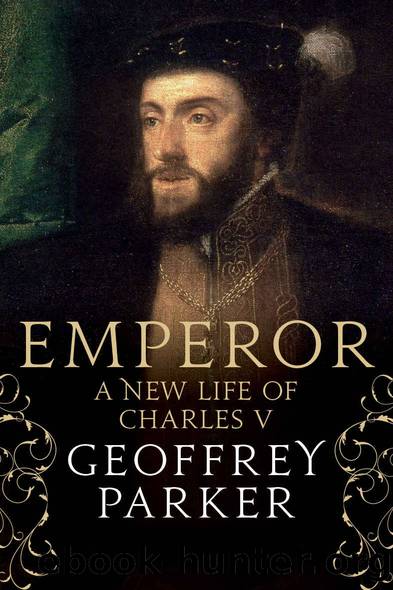Emperor by Geoffrey Parker

Author:Geoffrey Parker [Parker, Geoffrey]
Language: eng
Format: azw3
ISBN: 9780300241020
Publisher: Yale University Press
Published: 2019-06-24T16:00:00+00:00
THE EMPEROR STRIKES BACK
‘The arrival of the duke of Alba, with his Spaniards and the money has greatly raised our spirits,’ wrote a member of Charles’s entourage. ‘Now the council of war meets in the duke’s apartment for long and detailed discussions.’ The arrival of these reinforcements also strengthened Ferdinand’s bargaining position, and a week later at Passau he and Maurice reached a tentative agreement: on his brother’s behalf, Ferdinand promised an unconditional pardon for all who had taken up arms, the immediate release of Philip of Hesse and John Frederick of Saxony, and the summoning of an imperial Diet to find a permanent solution to the religious issue and to address all alleged abuses of power by the emperor and his agents since Mühlberg. In return, the confederates agreed either to disband their troops within ten days or to send them to defend Hungary. Almost immediately Maurice led his men to fight the Turks, while Charles entered Innsbruck ‘on horseback, showing himself more robust than usual, with his arquebus upon his saddle’. The emperor who only a month before had seemed ‘old and weighed down by his many infirmities’ now commanded over 68,000 troops in Germany with a further 41,000 in the Netherlands and 24,000 in northern Italy. What would he do with them?45
One possibility was a campaign in Italy, where the successful defiance of Parma had called into question Charles’s ability to impose his will; but in July 1552, Venice rejected France’s offer of alliance, which led almost all other Italian rulers to maintain their neutrality too. Only the republic of Siena threw caution to the winds – the citizens of its capital chased out the Spanish garrison amid cries of ‘France, liberty and victory’ – and Charles decided that his ministers in Italy possessed sufficient strength to prevent the ‘contagion’ spreading to other parts of the peninsula. Instead he announced that ‘We have resolved to deal, for the present, principally with finding a remedy for the affairs of Germany, on whose pacification the success of our affairs mostly depends’.46
This decision led to the worst strategic catastrophe of Charles’s reign: the siege of Metz. Luckily for historians, a profusion of surviving sources – above all, the correspondence of the emperor himself and of the ambassadors attached to his court – make it possible to reconstruct in detail his path to disaster.
Although the treaty of Passau restored peace to most of Germany, Charles still faced two important enemies. Albert Alcibiades of Brandenburg seized Trier at the head of some 12,000 men, ravaged adjacent Catholic lands, and threatened the Habsburg duchy of Luxemburg; and the French left a powerful garrison in Metz. The imperial army now marched towards the Rhine in two divisions: Charles, once again wearing full armour, rode at the head of the main contingent, which lodged each evening in the quarters vacated that morning by the vanguard under the duke of Alba. Nuncio Camaiani reported (with a mixture of admiration and irritation) that he could not divine
Download
This site does not store any files on its server. We only index and link to content provided by other sites. Please contact the content providers to delete copyright contents if any and email us, we'll remove relevant links or contents immediately.
| Military | Political |
| Presidents & Heads of State | Religious |
| Rich & Famous | Royalty |
| Social Activists |
Waking Up in Heaven: A True Story of Brokenness, Heaven, and Life Again by McVea Crystal & Tresniowski Alex(36999)
Empire of the Sikhs by Patwant Singh(22163)
We're Going to Need More Wine by Gabrielle Union(18064)
Hans Sturm: A Soldier's Odyssey on the Eastern Front by Gordon Williamson(16567)
Leonardo da Vinci by Walter Isaacson(11894)
The Radium Girls by Kate Moore(10901)
Educated by Tara Westover(7055)
Tools of Titans by Timothy Ferriss(6934)
How to Be a Bawse: A Guide to Conquering Life by Lilly Singh(6686)
The Last Black Unicorn by Tiffany Haddish(5065)
Permanent Record by Edward Snowden(4986)
The Rise and Fall of Senator Joe McCarthy by James Cross Giblin(4839)
Promise Me, Dad by Joe Biden(4440)
The Wind in My Hair by Masih Alinejad(4420)
The Crown by Robert Lacey(4098)
A Higher Loyalty: Truth, Lies, and Leadership by James Comey(4024)
The Iron Duke by The Iron Duke(3635)
Joan of Arc by Mary Gordon(3253)
How to be Champion: My Autobiography by Sarah Millican(3180)
